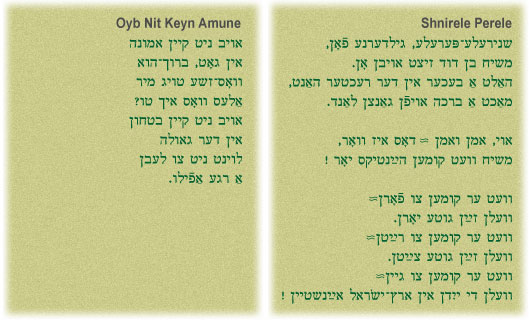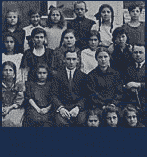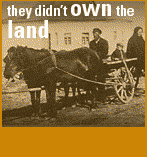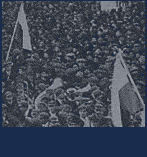

Shabes
The Shabes (Shabbat, in Hebrew) table was one of the most musical places in Jewish Eastern Europe. Jews had already begun to write specific piyyutim for Shabes in ancient times. By the Middle Ages the custom had evolved to sing certain songs at each one of the three meals of Shabes (Friday night, Saturday midday, and Saturday early evening). These songs were called zmirot  . A typical Friday night meal might include the singing of Sholem Aleykhem, from 17th-century Prague, Tzur Mishelo, attributed to the 2nd-century mystic, Shimon bar Yochai of Palestine, and Dror Yikra, composed by the poet Dunash ibn Labrat in 10th-century Baghdad. Most zmirot had Hebrew lyrics, but Yiddish was often used as well, as in the songs Oyb Nisht Keyn Emune
. A typical Friday night meal might include the singing of Sholem Aleykhem, from 17th-century Prague, Tzur Mishelo, attributed to the 2nd-century mystic, Shimon bar Yochai of Palestine, and Dror Yikra, composed by the poet Dunash ibn Labrat in 10th-century Baghdad. Most zmirot had Hebrew lyrics, but Yiddish was often used as well, as in the songs Oyb Nisht Keyn Emune ![]() and Shnirele Perele. There are thousands of different melodies for zmirot; some individual songs have hundreds of melodies. Although the words do not change, the melodies range from East European Hasidic tunes, to American pop, to those of Israeli folk songs.
and Shnirele Perele. There are thousands of different melodies for zmirot; some individual songs have hundreds of melodies. Although the words do not change, the melodies range from East European Hasidic tunes, to American pop, to those of Israeli folk songs.

Sholem Aleykhem ![]() is the best-known and universally performed Sabbath zemer (song). It is the custom is to sing it in the home right before the kiddush
is the best-known and universally performed Sabbath zemer (song). It is the custom is to sing it in the home right before the kiddush  (kidesh, in Yiddish), a Shabes blessing chanted over a cup of wine that marks the beginning of the meal. The title literally means "Peace be on you", a common Yiddish greeting derived from the Talmud that is still used in various forms in nearly all Jewish communities around the world. The oldest version of this we have today is part of a collection of mystical prayers from early 17th-century Prague. The text retells a story from the Talmud
(kidesh, in Yiddish), a Shabes blessing chanted over a cup of wine that marks the beginning of the meal. The title literally means "Peace be on you", a common Yiddish greeting derived from the Talmud that is still used in various forms in nearly all Jewish communities around the world. The oldest version of this we have today is part of a collection of mystical prayers from early 17th-century Prague. The text retells a story from the Talmud  , which describes how two angels, one good and one bad, escort every Jew back home from the synagogue on the Sabbath evening. The Jew blesses the angels, welcoming them into his home for the Sabbath. If the Sabbath table is well prepared, and there is a happy holiday atmosphere, the good angel blesses the Jew, promising another Sabbath just as sweet and good. The evil angel is forced to respond, "So be it". If this is not the case, the bad angel curses the Jew, "May you have just such another Sabbath", and the good angel is forced to respond, "So be it". The four stanzas of the song speak directly to the angels in the form of welcome greetings.
, which describes how two angels, one good and one bad, escort every Jew back home from the synagogue on the Sabbath evening. The Jew blesses the angels, welcoming them into his home for the Sabbath. If the Sabbath table is well prepared, and there is a happy holiday atmosphere, the good angel blesses the Jew, promising another Sabbath just as sweet and good. The evil angel is forced to respond, "So be it". If this is not the case, the bad angel curses the Jew, "May you have just such another Sabbath", and the good angel is forced to respond, "So be it". The four stanzas of the song speak directly to the angels in the form of welcome greetings.










